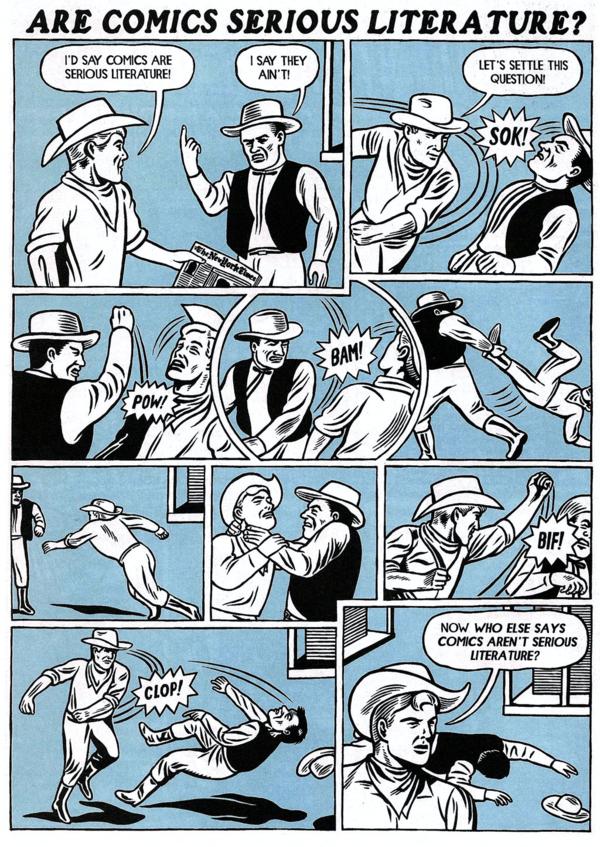I’ve always loved Michael Kupperman’s work, and I loved this. I laughed. But I couldn’t suppress the niggling complaint that it seemed to want something both ways. To have the cake of seriousness and also stick out a tongue coated in cake and bits of frosting. And in this it seemed far from alone, but part of a long tradition.
Now you could read Kupperman’s strip as a takedown of the mere question “Are Comics Serious Literature?” As if the question were so ridiculous as to be beneath asking, so that the only possible reaction would be to foreground that ridiculousness, treat it with the ridicule it deserved. Or you could read this as a takedown of people who still refuse to consider comics serious literature. Either way, a dismissal is involved, but not a refutation. We are serious; take us seriously, we say. Well, why should we? they reply. And we say, Nyah, nyah. I might call this reserving for oneself the eternal right to Nyah, nyah. Which is indeed a tradition, one I think of as American, though clearly it is far from exclusively so (witness Hal Duncan’s nonsense response to Geoff Ryman’s well-meaning Mundane SF manifesto). As a strategy, it reminds me of Gardner’s description of Donald Barthelme in an essay from On Writers and Writing (leave aside that Gardner misattributes Whitman to Emerson):
“He avoids style at any cost, and also avoids psychological or moral analysis, escaping despair by America’s oldest, still commonest trick: the childishness and befuddled innocence of Yankee Doodle, Huck Finn or Holden Caulfield—the childishness (in this case mad) that sneaks past oppressive reason.
‘The intellect,’ said Thoreau, ‘is a cleaver.’ In a world whose findings drove Melville half insane, the Transcendentalists’ ideal child indefensibly asserted convictions that felt right to basically sentimental and good-hearted, though often fierce and wrongheaded, Americans…
Like Ralph Waldo Emerson (‘I contradict myself?’), Barthelme’s crazies systematically evade the issue, and they encourage the reader to evade it too, with neurotically healthy vigor.â€
It may indeed seem I am busy making a mountain out of a molehill. And I do believe Kupperman’s one-pager was probably not designed to bear the critical weight I am assigning it. But it strikes me that the danger of the Nyah, nyah is that when not carefully deployed, it sounds a lot like “My hair is a bird.”
Nose-thumbing can be Dada, or it can just be nose-thumbing. The task of Nyah, nyah, when properly performed, should be to reject the question, the stakes of the argument, the rules of the discourse as set by the other side because they are set by the other side, and therefore constitute a game we cannot win. It may be that proof that comics are literature cannot take place on literature’s terms. It may be that we attempt to do so perhaps because such terms are the only ones the culture as a whole has. But if the game is rigged, it is not the only one in town. There is always room for another saloon. We cannot run from the challenge of building one like a bunch of no-good yellow-bellied low-down dirty eggsuckers.

Leave a Reply